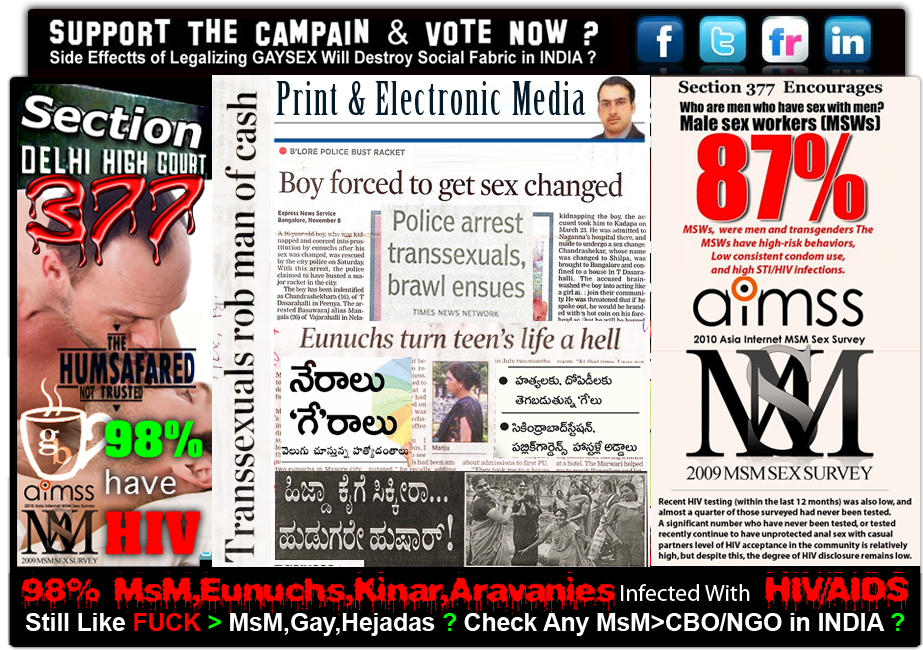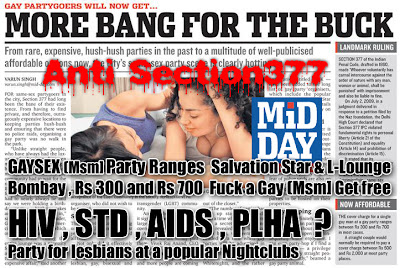Gay rights activists might well hail the Delhi High Court”s liberal interpretation of Section 377 of Indian Penal Code as a landmark, but a natural extension of the ruling seems laden with the potential of rupturing the high-discipline fabric of the defence forces, particularly the 11-lakh-strong Indian Army.
Although homosexuality in the troops is a raging topic within the armies of Britain and the US, their Indian counterparts consider “certain forms of disgraceful conduct” a serious offence under Section 46 of the Indian Army Act, 1950.
Under the Indian military law, any person (soldier) found guilty of “any disgraceful conduct of a cruel, indecent or unnatural kind” can be punished with imprisonment extending up to seven years if so convicted by a court martial. The provision relates to homosexuality and its presence in the statutes for six decades, if not more, indicates that such behaviour was not alien to the troops.
While the British Army has openly welcomed the entry of gays into its ranks and upheld gays, bisexuals, transsexuals), the situation in the US is largely guided by a ” compromise formula” proposed by President Bill Clinton in 1993.
The formula ” better known as the ” don”t ask, don”t tell” policy ” prohibits gays and lesbians from speaking about their sexual orientation while serving in the US armed forces. The moment this line is breached, the officer or the soldier is liable to be dismissed from service. The US Congress has passed a law that categorically states that homosexuals are ineligible to be enlisted.
The armed forces” sex-segregated environment, particularly in the Indian social context, has the potential of making some personnel indulge in situational homosexual behaviour although, quite often, these men could be heterosexual otherwise.
Senior army officers, who have served in isolated field formations, admit that such “deviant behaviour” was not “very uncommon” but ” the context has to be understood”. “Izzat (pride) being paramount for a battalion, the offenders are never tried under Section 46. When such instances come to light, the accused is either tried under some other section or simply asked to put in his papers,” an officer explained.
The Indian Army Act (1950), a near- replica of the Indian Army Act (1911) brought in by the British, is a “special” legislation.
It is unaffected by the latest interpretation of Section 377 of IPC by the Delhi High Court and, therefore, “unnatural offences” continue to carry severe punishment for the troops.
“But the larger point is that if the government does not challenge the high court”s interpretation, it would have little authority to let Section 46 continue in the Army statutes,” said a senior Supreme Court lawyer.
Interestingly, while the Indian Army Act, drafted under British influence, considers homosexuality as a serious offence, the situation in the United Kingdom has undergone a radical change.
British Army chief General Richard Dannatt has since proclaimed full support to the enlisting of homosexuals into the force and termed it as a “command responsibility” vital for “operational effectiveness”. On Saturday, uniformed representatives from the army, navy and police attended the Gay Pride March at London”s Trafalgar Square, an event which was marked by the presence of Prime Minister”s wife Sarah Brown.
Another Indian Army officer said that the two contexts ” of Britain and India ” could not be compared.
“Fighting for gay rights is largely a metropolitan phenomenon in India. But the Army recruits its soldiers from the villages, where homosexuality is taboo and deviant behaviour. I dread to imagine the impact that scrapping or diluting of Section 46 would have on the forces. Let us see if the Indian lawmakers have the guts to indulge in any such misadventure,” he said. (End of Article)
This article led me to think along the following lines -
1. Hindus have traditionally dealt with homosexual behaviors differently than have monotheistic (Abrahamic)societies.
2. Whilst the US might have (had) its straightforward “Don’t ask Don’t tell” policy, we choose to couch our disapproval in more general tones.
3. Hindusthan’s Army might have continued with a rule of British pedigree; however it’s not without basis in our own traditions.
4. The feeling I got was that homosexuality should remain undeclared in the Armed forces, for once declared, the existence of such behavior amongst predominantly heterosexual soldiers, becomes untenable. This is true in most if not all organizations and much more so in the Armed forces where one cannot really maintain high morale without worshipping at the feet of a virile Manhood.
5. But how is our civil-legal establishment taking in this scenario? Especially in the wake of the US Army repeal – will there be renewed calls and implorings for a copy-cat repeal of Section 46? It is heartening to note that as of now our Army is holding up liberal attempts to gate-crash its party but how much longer can it hold off?
6. Hindu nationalists have uniformly been unflinching supporters of our Armed forces. I think we should start making our views on the subject clear if only as a mark of continued support for our forces’ traditions.
From point of view of experience, the Section 377 drama has made certain things clear.
a. Hindu traditions of co-existence can and will be subverted through legal processes.
- For instance Section 377 (criminalizing homosexual behavior) would never have been a Hindu law because Hindus have dealt with homosexuality by terribly under-prioratizing it. However, the existence of a criminalizing law in Section 377 (instituted by alien rule) provided a handle to crusading liberals to move to decriminalize it thereby effectively legalizing such behavior. So, logically Section 46 must fall too.
b. Silence on the part of Hindu nationalists will no longer do.
- During the debates around Section 377 Hindu organizations did not adopt a combative contrarian stance. Except for individual nationalists, there wasn’t really much official Hindu noise. This unwholesome silence encouraged homosexual activists and their friends to hijack the Hindu platform proclaiming “different sexualities are celebrated within Hindu society”. This claim should have been immediately contested and the record set straight. We should have been telling them that Hindu society whilst recognizing the existence of sexualities, nevertheless does not legitimize them as equally valid.
If Hindu organizations think that there is no threat to our Forces, they need only look at the US Army today. Nothing is impossible with a Barak Obama in our Law Ministry.
Hindu organizations should at least articulate a loud and clear stance on the subject.
In closing,
I would like to point to a very perceptive comment by
“Tim W”on Lawrence Auster’s site on the topic of the US Army repeal -
I would like to point to a very perceptive comment by
“Tim W”on Lawrence Auster’s site on the topic of the US Army repeal -
Homosexuals are by definition individuals who are sexually attracted to persons of the same sex. A male homosexual desires other males. Lesbians desire other females. This is obvious, yet it is ignored in media or political discussions of certain homosexual agenda issues. Homosexuals have been trying for years to force the Boy Scouts of America to accept homosexual scoutmasters. These men would take young boys camping. I’ve heard people defend this by claiming that homosexuals are no more likely than heterosexuals to molest children. I don’t believe that’s true, but even if it is, it’s irrelevant. It would be relevant only if adult straight males were demanding the right to take little girls camping. Can you imagine the outrage if heterosexual men were making such a demand?
Congress is now moving to admit open homosexuals to the military. We’re told that homosexuals are no more likely to engage in sexual misconduct or harassment than heterosexuals. That’s debatable, but so what? Heterosexual men in the military don’t bunk down and shower with the women. But homosexual men will indeed bunk down and shower with the other males if Obama gets his way. Ditto for lesbians and the other females. There would be universal outrage if heterosexual male soldiers demanded to shower with naked female soldiers, but naked male soldiers are expected to shower with homosexuals who might desire them. Female soldiers are expected to shower with lesbians.What we’re being told, indirectly, is that homosexuality is a more enlightened form of sexuality. We can’t allow young men to take girls camping because that would lead to pedophilia, but it’s no problem to let homosexual men take boys camping. We can’t let heterosexual males shower or bed down with females in the military. That would lead to sexual harassment, and the ladies would feel uncomfortable that a bunch of lustful guys are seeing them nude. But no one of either sex should have any problem with being in such a situation with a homosexual. Heterosexuals can be barred from situations where sexually improper behavior might result, but homosexuals cannot. Indeed, they have a right not to be barred.





